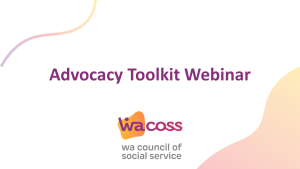Children moved to maximum security prison last straw for broken system
5 July 2022
This media release contains comments attributed to: Glenda Kickett, Co-Chair Social Reinvestment WA; Louise Giolitto, CEO WA Council of Social Service; and Sandy McKiernan, CEO Youth Affairs Council of Western Australia.
- Social Reinvestment WA calls for real solutions for youth justice system after state government announces plans to house 20 children in maximum security men’s prison.
- Banksia Hill Detention Centre is in crisis, as government reports have found repeated instances of instability, human rights abuses, and mental health crises at the facility,
- 70% of the young people in Banksia are unsentenced, and 109 this past year were between 10 and 13 years old.
- In February 2022 Social Reinvestment WA called for 6 key areas for immediate action including recommendations to immediately move children under the age of 14 and young people on remand out of the centre.
- The State Government announced plans to improve Banksia Hill Detention Centre in April 2022, but experts have said this is not enough to address the underlying causes of the problem.
- The latest news follows damning statistics released last week in Budget Estimates, detailing high staff turnover and infrastructure damage, and a fifteen-fold increase in suicide attempts among detainees since 2019.
Maximum security prisons cannot meet the needs of traumatised children with complex needs. It fails to respond to the underlying causes of their offending.
“If our only option for youth detention is placing vulnerable children into maximum-security prison, then our youth justice system is broken. Children do not belong in prison and we need serious reform to fix the constant state of crisis in youth detention and end the harm our approach is causing.” – Louise Giolitto
“Prisons are not the answer for children – they are traumatising, they separate young people from their families, and they fail to rehabilitate. Moving young people to maximum security prison means we are placing children at greater risk of harm while doing nothing to address the staff shortages or deal with the underlying causes of offending.” – Sandy McKiernan
“How old are these young people being placed in one of the scariest environments we have here in WA? The majority of young people in detention have serious cognitive impairments, tough lives, and need specialised, trauma informed care. Children’s needs cannot be met in a prison.” – Glenda Kickett
Successive failures and human rights breaches at Banksia Hill are symptoms of a broken system.
“Banksia Hill improvements are years away from completion. A government report released months ago found the centre is breaching the human rights of children. We are seeing rolling lockdowns and staff shortages mean young people are locked down for up to 22 hours a day without end.” – Sandy McKiernan
“Our youth justice system is breaching the human rights of young people- and Aboriginal and Torres Strait Islander children are the vast majority of those incarcerated. The state government has ignored the root causes of the problems. This must be our wake-up call to fix our system and provide the early intervention, diversion, and rehabilitation supports children need in the community.” – Glenda Kickett
“We need immediate plans to invest in community-based alternatives and supports, so we can get young people out of detention. Sending young people to maximum security prison is not the solution.” – Louise Giolitto
It is possible to both increase community safety, and ensure the rights and wellbeing of young people are upheld.
“Early intervention and prevention are the best solutions to address the problem of youth detention. Getting help to struggling kids earlier on, and diverting them, provides a better outcome for everybody – it keeps kids out of prison, it saves us money, and it makes communities safer.” – Sandy McKiernan
“Our focus on prisons and cells is failing children and young people, and it is failing communities. Children need help not harm, to address the underlying reason that they are offending.” – Louise Giolitto
“Children belong with their families and in communities. We have better solutions available to change the system – we need to end the detention of young people on remand, to raise the age of criminal responsibility to at least 14, and to invest in caring for children in our community.” – Glenda Kickett
We need a long-term, system-wide vision for reform of youth justice in our state to balance community safety and the rights and wellbeing of children.
Social Reinvestment WA is calling on three key actions to address the issues in our youth justice system:
- Immediately move young people aged between 10 and 13 and on remand out of prison
- Develop a real solution across government silos to fix our broken youth justice system that intervenes early and turns off the tap of young people entering the justice system.
- Identify the communities in most urgent need of youth justice action, and resource justice reinvestment initiatives- addressing root causes, in partnership with the community.
Download a pdf version of this media release here.
About Social Reinvestment WA:
Social Reinvestment WA is a coalition of 30 non-profit organisations campaigning since 2014 to end the overrepresentation of Aboriginal and Torres Strait Islander people in WA. They lead development of justice reinvestment solutions in partnership with communities, and run the Raise the Age campaign in WA.
Media Contact:
Sophie Stewart
Social Reinvestment WA Campaign & Coalition Manager
Ph: 0434 968 276 | E: [email protected]




